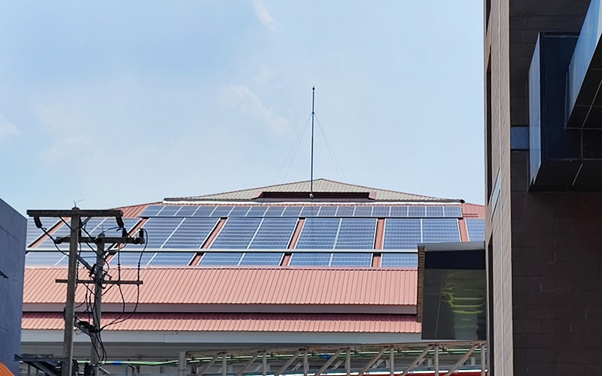Adopting solar energy is more accessible than ever in Singapore, but a common concern remains: how much does it cost? The price of a solar panel in Singapore depends on several factors, including materials, installation scale, and post-installation benefits like renewable energy certification. Understanding these variables not only helps you prepare for the investment but also helps you maximise long-term value as clean energy continues to gain traction locally.
1. Size and Scale of Your Solar Installation
The cost of a solar installation is typically calculated per kilowatt-peak (kWp) of capacity. For most residential properties in Singapore, this ranges from 3 to 10 kWp, which significantly influences the price of solar panels in Singapore. Larger systems offer lower cost per kWp but naturally require more upfront investment. For example, a 5 kWp setup might cost approximately SGD 12,000 to SGD 15,000, while a 10 kWp system could run up to SGD 25,000. These figures can vary depending on the rooftop structure, required mounting systems, and overall accessibility.
2. Equipment Type and Material Quality
Not all solar panels are built the same. Monocrystalline panels, though more efficient, come at a higher price compared to polycrystalline alternatives. Inverters and mounting structures also play a role in determining the overall cost of solar energy. Advanced inverter systems with smart monitoring may improve performance and make maintenance easier, but will add to the base cost. Meanwhile, the choice between string inverters and microinverters could affect not just efficiency but installation pricing as well.
3. Installation Complexity and Rooftop Design
Flat, open rooftops are ideal for solar installations. Unfortunately, not all homes in Singapore offer such ideal layouts. If your roof has obstacles such as water tanks, air conditioning units, or angled planes, installers must adapt mounting systems or cable routes, which increases installation labour and cost. Furthermore, high-rise HDB flat owners cannot install private systems unless coordinated through government-linked programmes, limiting installations primarily to landed homes and commercial properties.
4. Brand Reputation and Service Packages
The choice of solar service provider affects cost beyond hardware. Established companies tend to offer packages that include maintenance, warranties, and performance monitoring. While their quotes may be higher initially, they often ensure smoother installations, clearer documentation, and post-installation support. These bundled services offer long-term peace of mind, especially in environments like Singapore, where rainfall and rooftop debris can impact panel efficiency.
5. Ownership Model: Buying vs Leasing
Homeowners in Singapore have the option to either purchase their systems outright or explore leasing models. With leasing, you avoid the large upfront payment but commit to a long-term fee that may or may not include maintenance. Buying outright means higher initial costs, but the investment typically pays for itself within 6 to 8 years, depending on system performance and energy savings. This difference also affects eligibility for renewable energy certifications, which benefit only actual system owners.
6. Ongoing Maintenance and Operation Costs
Though minimal, maintenance costs should be considered when calculating the total cost of solar energy. Cleaning, inspection, and inverter servicing can add to the lifetime system expense. Most quality systems require little upkeep, but regular inspections are advisable in Singapore’s tropical climate, where dust and algae buildup can reduce efficiency over time. A typical maintenance contract may cost between SGD 300 and SGD 500 annually, depending on the size of your system and the services included.
7. Renewable Energy Certificate in Singapore
One often overlooked financial component is the renewable energy certificate in Singapore (REC). These certificates verify that the energy generated by your solar system is from a renewable source. They can be sold to businesses or institutions aiming to offset their carbon footprint. If your system is eligible for certification, it becomes a potential revenue stream. This aspect is especially valuable for larger systems on commercial buildings, where selling RECs can supplement energy cost savings. Homeowners with registered systems can also participate, depending on the system’s capacity and compliance with local standards.
8. Environmental and Regulatory Compliance
Singapore continues to push for greener infrastructure and energy independence. While there are no direct subsidies for residential solar adoption, government policies and building standards increasingly favour renewable energy integration. Systems that meet compliance benchmarks may benefit from future programmes or receive prioritised support during public sector tenders. Working with a provider familiar with these frameworks ensures your system is future-proofed in case of upcoming regulatory shifts.
9. Return on Investment and Long-Term Savings
Ultimately, evaluating solar panel prices in Singapore comes down to ROI. A system that offsets 60–80% of your electricity bill can save you thousands over its 25-year lifespan. Factoring in potential earnings from a renewable energy certificate in Singapore, the total cost of solar energy becomes increasingly viable. With rising utility rates and the global move towards decarbonisation, installing a solar system is a forward-thinking choice that benefits both household budgets and the planet.
Conclusion
While the price of solar panels in Singapore varies based on system size, equipment quality, and roof conditions, the long-term value of adopting solar energy is clear. Understanding how these factors contribute to total installation cost allows property owners to make informed, strategic decisions. When paired with RECs and ongoing savings, a solar installation functions as a lasting investment in a cleaner Singapore, a role that extends far beyond being a simple purchase.
To explore certified solutions and pricing guidance tailored to your home or building, contact Perry Management Clean Energy today.

